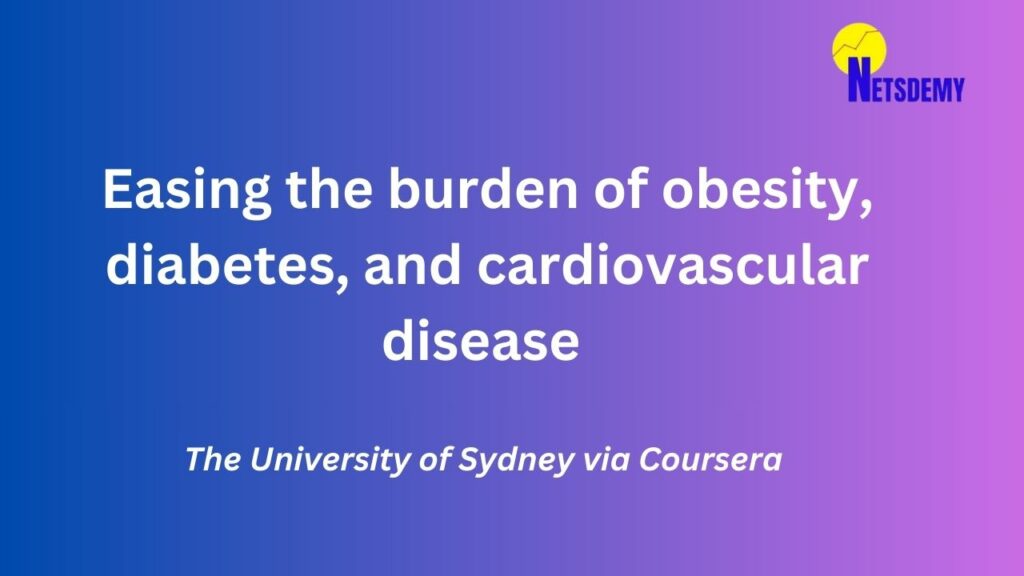
The “Easing the Burden of Obesity, diabetes, and cardiovascular disease” course focuses on strategies to manage and prevent these health conditions. It explores lifestyle changes, diet modifications, and exercise routines to improve overall health and well-being. Its primary goal is to explore the chronic diseases such as obesity, diabetes, cardiovascular ailments, chronic obstructive pulmonary disease (COPD)
The course “Easing the Burden of Obesity, Diabetes, and Cardiovascular Disease” is an interdisciplinary endeavor hosted by the Charles Perkins Centre at the University of Sydney. The course aims to equip a diverse audience including laypeople, individuals with chronic diseases, public health professionals, healthcare providers, students, administrators, and researchers with a comprehensive understanding of the broader impact of chronic diseases on society.
One of the key premises of this course is the recognition that chronic diseases are not isolated entities but are deeply intertwined, sharing common underlying causes and influencing factors. These causes encompass a wide spectrum ranging from genetic predispositions to environmental, psychological, economic, social, developmental, and media-related influences. The course underscores the importance of adopting a multidisciplinary approach, emphasizing collaboration across various fields such as science, medicine, architecture, humanities, law, and others.
Throughout the course, participants will delve into the intricate details of chronic diseases, exploring their origins, risk factors, and the complex interplay of environmental and biological elements. The course encourages a holistic perspective, recognizing the need for integrated solutions that address the multifaceted nature of chronic diseases.
One of the unique aspects of this course is its emphasis on a complex systems approach. This approach acknowledges the interconnectedness of various factors influencing chronic diseases and advocates for comprehensive solutions that consider these interconnections. It challenges the notion of simple, one-size-fits-all solutions like diet and exercise, emphasizing instead the need for nuanced, multifaceted strategies.
The course is structured into five content modules, each focusing on different chronic disease aspects, to explore global incidence rates and risk factors. An extra module is dedicated to assignments and discussions, providing participants with opportunities to engage deeply with the course material and apply their learning in practical contexts.
Upon successful completion of all modules, participants receive a completion certificate, recognizing their active participation and engagement with the course content. By the end of the course, participants will have gained insights into:
- The interdisciplinary approach adopted by the Charles Perkins Centre to address chronic diseases.
- The necessity of employing complex systems thinking in tackling complex health problems.
- Current trends and future directions in chronic disease research.
- The significant risk factors contributing to chronic diseases and their global prevalence.
- The diverse influences – genetic, societal, regulatory, and others – shape these risk factors.
- Strategies for developing and implementing global solutions aimed at reducing the burden of chronic diseases.
Syllabus
Module 1 – Understanding the Problem:
Explore the global rise in chronic diseases and learn about the innovative approach taken by the Charles Perkins Centre to tackle this complex issue.
Module 2 – Major Chronic Diseases:
Discover the five primary non-communicable diseases Obesity, Diabetes, Cardiovascular Disease, Chronic Obstructive Pulmonary Disease, and Cancer.
Module 3 – Examining Risk Factors:
Delve deeper into the key risk factors associated with chronic diseases. Analyze how our modern environment contributes to the growing burden of preventable illnesses.
Module 4 – Unpacking Causes:
Gain insight into the biological, environmental, dietary, and psychological factors that have led to the current chronic disease crisis.
Module 5 – Seeking Solutions:
Explore the intricacies of addressing chronic diseases and learn about the potential of a comprehensive systems approach to health challenges.
